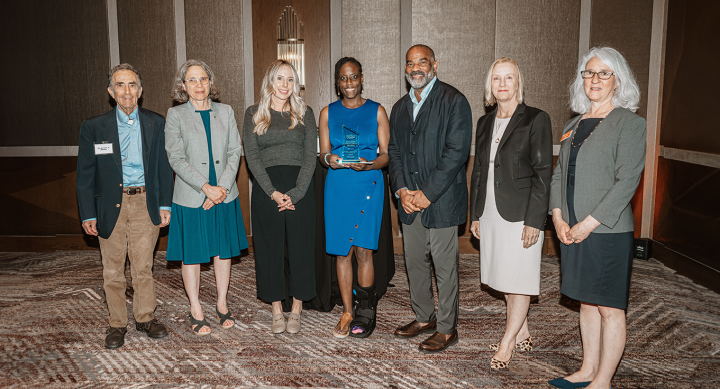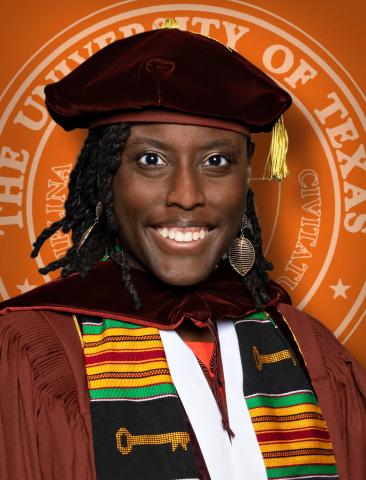
Faith Deckard, a recent doctoral graduate who studied sociology in the College of Liberal Arts, has focused her research on better understanding how people and their families navigate the criminal legal system and its aftermath. Winner of the 2024 Michael H. Granof Award for her dissertation, Bonded: Bail Agents, Families, and the Management of Risk, she examines how the cash bail system entangles not just individuals but also families in a complicated economic and social system of obligation, debt and punishment.
The Michael H. Granof Award, the Graduate School’s top dissertation prize, was established in 1979 to recognize exceptional work by doctoral students and encourage the highest levels of scholarship, research and writing. This award is generously underwritten by the University Co-op and is presented at the Graduate School/University Co-op Awards Banquet each spring. The annual winner receives a $10,000 prize.
Through qualitative interviews and ethnographic observations, Deckard shows how subjugated populations manage and cope with the pernicious effects of money bail. In her research, she found that co-signed loan arrangements can be used to incentivize family members to surveil their loved ones through the completion of their criminal cases, which has far-reaching negative consequences on families.
The committee selected Deckard for this year’s top prize because of the high quality and broad import of her dissertation. Her project draws on interviews and observational data to develop a compelling account of how the support networks of historically marginalized groups are exploited and exhausted by the legal system.
Associate Professor Sarah Brayne, one of Deckard’s recommenders in the Sociology department, wrote: “I am confident that her dissertation will make a strong impact to sociological research on economic instability, racial inequality and the criminal legal system. Moreover, bail reform is a topic of immense policy relevance today, and her work will be the first of its kind to empirically map and theorize the ‘social cost of affording bail.’”
Deckard’s adviser in the Sociology department, Javier Auyero, wrote: “Faith’s dissertation breaks new ground in our understanding of the social and symbolic impacts of one of the least studied dimensions of what Loïc Wacquant calls the ‘criminal processing machinery.’ It is hard for me to think of a more timely and original sociological project with such clear policy implications.”

Deckard, who just graduated last month, took time to answer some questions about her work:
What is the overall goal of your dissertation project and how would you explain your research methodology to a non-specialist audience?
Many of us have likely driven past a bail bond agency, seen advertisements or watched a show depicting agents or bounty hunters in action. However, from an academic standpoint, and particularly a sociological one, we don’t know a whole lot about how the commercial bail system works on the ground. By commercial bail system, I mean third-party companies who bond people out of jail prior to their court dates in exchange for a fee and cosigned loan agreement.
My dissertation project sought to understand how this system, which two million people rely on every year for pretrial release, works. What I found is that family members are vital to the operation and, consequentially, impacted by it.
To uncover the inner workings of commercial bail and its implications, I talked to the people most intimately involved, primarily bail agents, defendants (people being bonded out) and cosigning family members. I also spent a year observing three bail agencies to document agents’ daily practices and interactions with clients and to understand the environment they worked within and why they ultimately made certain decisions.
What drew you to the subject of sociology and how did you decide to focus your dissertation project on cash bail and the criminal legal system?
I’m drawn to sociology because it includes the “both/and” - it acknowledges that people have agency or free will and that things like structures, laws, norms and even other people can influence, and often constrain, that free will. While our social world provides many things to study, my indirect exposure to the criminal legal system through multiple family members made my research interest pretty clear to me. The same is true of my decision to narrow my focus to cash bail.
During my first year of graduate school, one of my younger brothers was arrested twice within a very short time span, so twice I sent money home for his bail and witnessed my family’s well-being erode, bend and adapt under carceral, financial and social pressure.
When I searched the literature, both out of academic interest and personal longing for advice or help, I was surprised to find a dearth of information about commercial bail and its impact on families. So, in a way, my project found me.
What were the key findings of your research? Did those findings point to any tangible policy solutions?
The key finding of my research is that bail agents, the industries’ front-line workers, use various techniques to encourage selected family members to assume responsibility for getting their defendant-kin to appear in court. Beyond transferring money to bail agencies, these individuals are expected to provide their own surveillance labor and emotional resources toward a state project of pretrial risk management. Given that criminal legal contact is disproportionately concentrated among Black and Latino men and women are more likely to provide support (in the form of cosigning or otherwise), it is women of color who are disproportionately burdened with managing state problems and those that arise at home. At the same time, their efforts culminate in profit for agencies and justice functioning for the state.
I am still thinking through tangible policy solutions, but what is clear to me presently is that to make meaningful, holistic changes, we have to start from the assumption that cash bail impacts families/communities, not individuals and that the harm it produces is multifaceted (financial, social, emotional) and unevenly distributed.
Did you encounter any significant challenges in your research? If so, what were they and how did you overcome them?
It’s an interesting thing to be close to a topic. On the one hand, having familiarity offers a unique position from which you can ask different questions or apply different interpretations.
On the other hand, having intimate knowledge or personal experience means that while doing research, you re-live things, you feel things deeply and you are forced to give up any pretense of objectivity.
I found myself having to be vigilant about what my objective was – it was not to conduct a study about my family. However, my familial experience did make me particularly well-suited to identify patterns and processes that help us better understand how commercial bail works and the plight of millions of families (and thousands of bail agents).
What did it feel like to learn you had won the Graduate School’s most prestigious dissertation prize?
Surreal, and it still feels that way. I’m a first-generation college student, so getting my Ph.D. is that much more foreign and unfamiliar to my family. When I called home to tell them I had won the dissertation award they were, of course, excited and happy for me, but I could tell they didn’t fully comprehend how big of a deal this was. I had won fellowships and paper awards before, so this was just one more thing, right?
That’s what they thought until they attended graduation and saw my picture plastered in the program and heard President Hartzell mention me by name and proceed to talk about my work. The embraces, enthusiasm and utter awe that I was met with once graduation ended communicated to me that they really understood how big of an achievement this was and how hard I had worked these past several years to do justice to a topic I cared so deeply about.
So, I’m just humbled and grateful to have the work recognized and validated in a way that made my family proud. I’m looking forward to seeing what my grandfather does with the 10+ programs he left the ceremony with.
What are your plans now that you’ve graduated?
Well, I’m off to UCLA in the fall to begin my career as an assistant professor of sociology. While I’m extremely excited about this next phase of life, I’m also a little nervous and am becoming very nostalgic about Texas, where I’ve lived my entire life. So, I’m just doing my best to be present this summer. I’m soaking in Austin, hanging out with friends, traveling home to see my family when I can and of course, doing a little reading and writing. I am an academic, after all!

